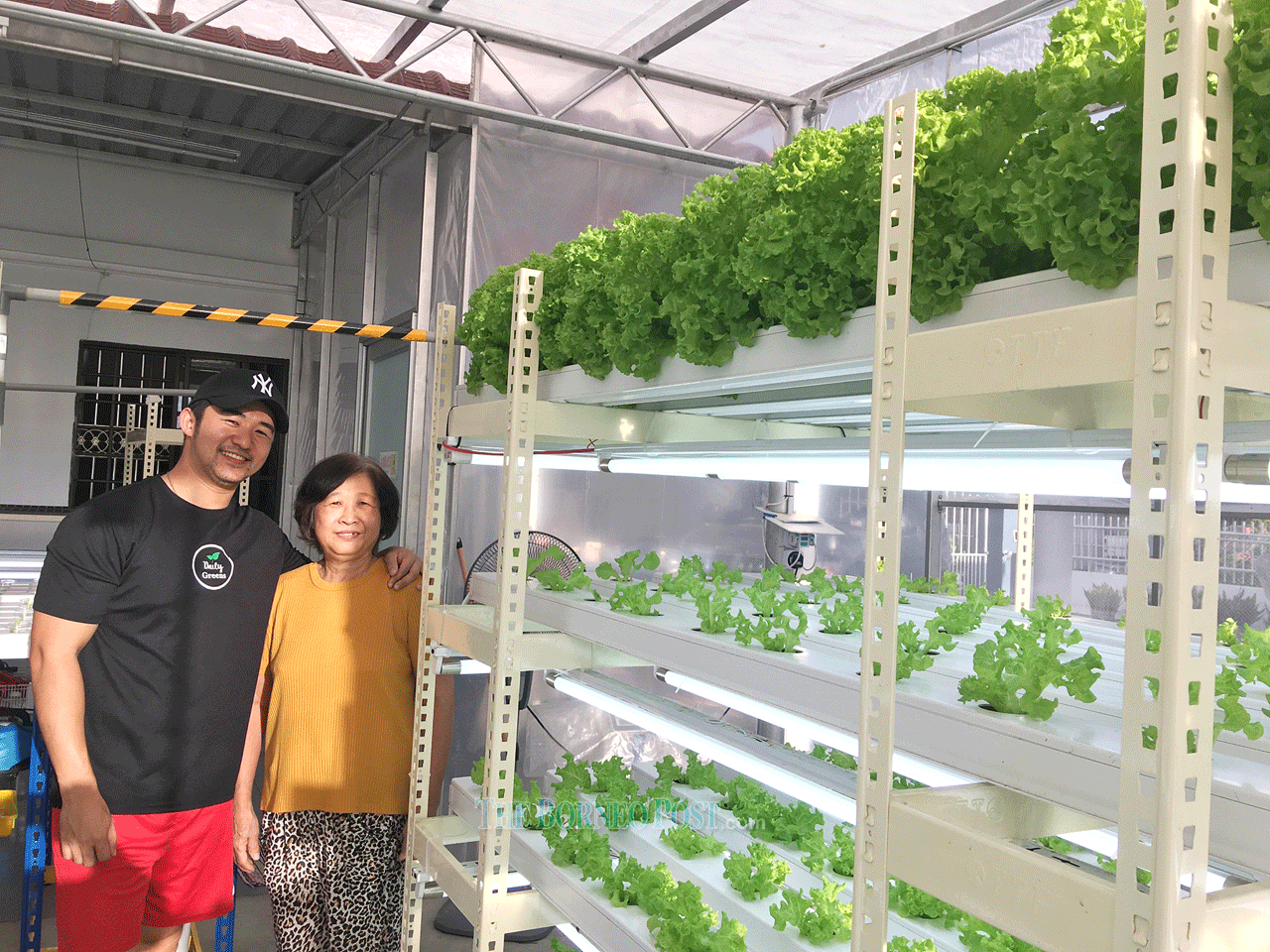
Welcome to iGrow News, Your Source for the World of Indoor Vertical Farming
Former Pilot Grounded With Urban Farming
URBAN farming is fast catching on in Malaysia with many young people taking it up to grow vegetables in the backyards of their city dwellings
BY JENIFER LAENG ON JUNE 14, 2020
Chuo’s hydroponic lettuces are grown in the backyard of his parents’ home.
URBAN farming is fast catching on in Malaysia with many young people taking it up to grow vegetables in the backyards of their city dwellings.
There are many types of urban farming but one that is popular with many city folk is hydroponics.
Former pilot Eric Chuo Chuan Jin of Miri said he developed his interest in urban farming, particularly hydroponics, when he changed his diet last year.
“It all started when I became concerned about my health. I began working out and making changes to my eating habits, basically looking for clean and nutritious food.
“But eating healthy isn’t easy, especially here, and to get around this, I started thinking about how I could grow clean food in the backyard,” the 31-year-old recalled.
Chuo regularly checks on the lettuces he grows in his parents’ backyard.
Chuo said he researched the subject online and attended a hydroponics course in Kuala Lumpur.
“Thankfully, we have the Internet where we can pick up a lot of things. That was how I learned about hydroponic techniques.”
Of the many hydroponically grown vegetables, Chuo chose lettuces such as green coral, butterhead, and red leaf.
It took him some two months — from November last year — to plan and set up his small soil-less farm in his parents’ backyard (about 1,500 square feet) at Taman Tunku.
Chuo admitted starting the project wasn’t smooth sailing and it took him some time to get things right. But with all the trials and errors behind him, he has been reaping the fruits of his labour with good lettuce harvests since January.
New batches of lettuce are continuously planted to ensure consistent supply.
Before going into hydroponic farming, Chuo was a pilot, then a service engineer in Brunei, before moving back to Miri for good.
Opportunities
As he started to harvest more and knowing the difficulty in obtaining fresh and pesticide-free vegetables locally, Chuo realized the huge potential in commercializing his organic greens.
Subsequently, he set up a company to supply fresh, quality, and affordable vegetables to the people in Miri.
Chuo and his mum stand beside the stands of his hydroponic greens.
With his parents’ help, he has so far managed to sell to a few fruit stores, restaurants, and supermarkets.
“I supply about 5kg of lettuces daily to these places. Sometimes, I get surprise purchases from walk-in customers as well,” he said.
Chua said while he was able to do business under the Movement Control Order (MCO) and the Conditional MCO from March 18 till June 9, he couldn’t supply to restaurants which had been closed due to the lockdowns.
A few days before these lettuces are harvested.
“As you know, lettuces are widely used in restaurants for western food. So when they stopped operating, I was forced to look for other options.
“That was when I approached and negotiated with the supermarkets and stalls, selling fresh fruits, to include my vegetables on their racks. Thankfully, I managed to find these much-needed outlets,” he said.
Now, with the lifting of restrictions, Chuo said he couldn’t wait to resume business with the restaurants he had previously supplied
Challenges
While enjoying good business with his homegrown lettuces, he also faces the challenge of maintaining the amount he produces — on top of vouching for their quality — to ensure consistent supply to meet demand.
According to Chuo, one of the main concerns is the weather as lettuces need cool weather and slight shading to grow.
Fresh lettuces ready for delivery to the supermarket.
He needs to check the water level regularly to produce quality vegetables. The ventilation uses a timer, so it’s easy to control the moisture.
Another consideration is the high electricity bill.
“The ventilation, including the watering system, is automated, so electricity consumption is relatively high. But this is not a big issue,” he said.
Chuo pointed out that due to the limited growing space and the lengthy period between harvests, he had to keep planting in batches to ensure uninterrupted supply.
“It takes 45 days for each head of lettuce to be ready for harvest. So I have to plant continuously to avoid running out of stock. The challenge is I have limited growing space.”
Because of the huge market potential for his products in Miri, Chuo said he would be starting another project soon.
“I’m trying to plant other vegetables as well — tomatoes and herbs such as parsley.
“I’ll be using the same hydroponic and pesticide-free techniques to keep the taste, freshness, and quality of the vegetables,” he said.


